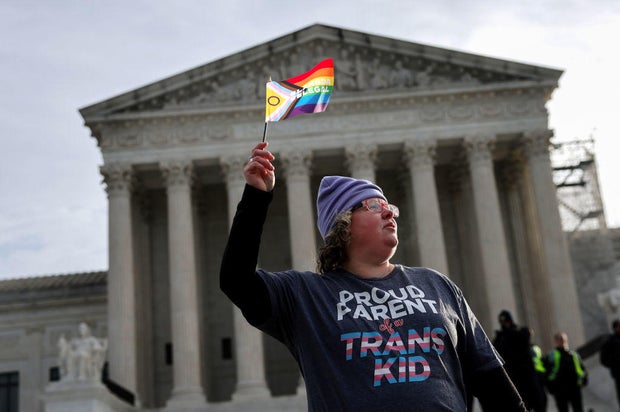Supreme Court appears likely to uphold Tennessee ban on gender-affirming care for kids
Washington — The Supreme Court on Wednesday appeared sympathetic to Tennessee's efforts to restrict access to gender-affirming care for minors experiencing gender dysphoria, as the justices stepped into the politically charged debate over health care for transgender youth.
Twenty-four states have passed laws similar to Tennessee's, which prohibits puberty blockers or hormone therapy for those under the age of 18. The dispute brought by the Biden administration, three families and a doctor tests whether states cross a constitutional line when regulating medical care that transgender adolescents argue is crucial to their well-being.
The court's conservative justices appeared likely to side with Tennessee in the case. Several cited "evolving" medical research as to the benefits and risks of gender-affirming care for adolescents experiencing gender dysphoria. At numerous points during arguments, which ran more than two hours, several members of the conservative wing questioned whether determinations about policies with shifting scientific findings are for courts to decide, rather than best left to state lawmakers elected by the people.
"If the Constitution doesn't take sides, if there's strong, forceful, scientific policy arguments on both sides in a situation like this, why isn't it best to leave it to the democratic process?" Justice Brett Kavanaugh asked.
Chief Justice John Roberts noted recent studies by some health authorities in European countries that have warned of insufficient evidence on the efficacy of treatments for transgender youth. Following an independent review from the United Kingdom, England's National Health Service stopped prescribing puberty blockers and hormones to minors with gender dysphoria.
"We're not the best situated to address issues like that," Roberts said. "Doesn't that make a stronger case for us to leave those determinations to the legislative bodies rather than try to determine them for ourselves?"
Justice Neil Gorsuch, who authored a 2020 decision that extended protections from discrimination in the workplace to transgender and gay employees, did not ask any questions.
U.S. v. Skrmetti
The case before the Supreme Court, U.S. v. Skrmetti, involves a Tennessee law known as SB1 that was adopted in 2023. It bars health care providers from administering puberty blockers or hormone therapy if they're meant to enable "a minor to identify with, or live as, a purported identity inconsistent with the minor's sex." The state argued that it has a "compelling interest in encouraging minors to appreciate their sex, particularly as they undergo puberty," and in prohibiting treatments that "might encourage minors to become disdainful of their sex."
Tennessee's law is part of a wave of measures passed by GOP-led states in recent years prohibiting gender-affirming care for minors experiencing gender dysphoria. President-elect Donald Trump has also pledged to restrict medical treatments for transgender adolescents and prohibit transgender athletes from competing in women's sports, another area where states have enacted bans.
During oral arguments, several of the court's conservative justices sounded skeptical of the federal government's assertion that Tennessee's ban should be struck down as unconstitutional because it discriminates based on sex. They also raised concerns about the evidence surrounding the efficacy of the treatments and questioned whether courts should second-guess state lawmakers on the issue.
"If it's evolving like that and changing, and England's pulling back and Sweden's pulling back, it strikes me as a pretty heavy yellow light, if not red light, for this court to come, the nine of us, and constitutionalize the whole area when the rest of the world, or at least the countries that have been at the forefront of this, are pumping the brakes on this kind of treatment," Kavanaugh said.
Roberts echoed that sentiment, saying the justices "might think that we can do just as good a job with respect to the evidence here as Tennessee or anybody else, but my understanding is that the Constitution leaves that question to the people's representatives rather than to nine people, none of whom is a doctor."
Justice Samuel Alito sparred with Solicitor General Elizabeth Prelogar, who argued on behalf of the Biden administration, over medical research on puberty blockers and hormone therapy, peppering her with questions about the findings of studies into the benefits and risks of gender-affirming care for minors.
Kavanaugh, later joined by Justice Amy Coney Barrett, questioned the implications of a decision that would adopt the Biden administration's preferred standard of review that judges should apply when weighing the constitutionality of Tennessee's law and others like it.
"What would that mean for women's and girl's sports in particular?" he asked Prelogar. "Would transgender athletes have a constitutional right, as you see it, to play in women and girl's sports — basketball, swimming, volleyball, track, etc. — notwithstanding the competitive, fairness and safety issues that have been vocally raised by some female athletes?"
The Biden administration has argued that the lower court applied the wrong standard when evaluating the constitutionality of Tennessee's law. The U.S. Court of Appeals for the 6th Circuit held that the ban is subject to rational-basis review, the most deferential of the three tiers of scrutiny. But Prelogar has argued the law should be subject to a more stringent level of judicial review, known as heightened scrutiny, because it classifies based on sex and discriminates based on transgender status.
If the Supreme Court agrees with the Biden administration, it could send the case back to the lower court to apply that more demanding standard, as Prelogar is asking it to do.
The court's liberals highlighted the potentially dire consequences of gender dysphoria and the role of gender-affirming care in addressing them, and likened Tennessee's ban to state laws that discriminated on the basis of race in the past. They grilled the attorney appearing on behalf of the state, Tennessee Solicitor General J. Matthew Rice, with questions aimed at showing the state's law constitutes sex-based discrimination.
"The whole thing is imbued with sex. It's based on sex," Justice Elena Kagan told Rice. "You might have reasons for thinking that it's an appropriate regulation and those reasons should be tested and respect given to them. But it's a dodge to say, this is not based on sex, it's based on medical purpose."
Justice Sonia Sotomayor argued the "evidence is very clear that there are some children who actually need this treatment."
Rice argued that the state is trying to protect young people from "irreversible and life-altering consequences" of these medical interventions and said the treatments are "risky" and "unproven." The law, he told the Supreme Court, sets age- and use-based limits on medical care, and is a routine exercise of the state's authority to regulate medicine.
"Politically accountable lawmakers, not judges, are in the best position to assess this evolving medical issue," he said.
But the Biden administration, along with the three Tennessee families and Memphis doctor, assert the state's ban draws sex-based lines and discriminates based on transgender status, a violation of the Constitution's guarantee of equal protection.
Under Tennessee's law, an adolescent assigned female at birth cannot receive puberty blockers or testosterone to live and present as a male, but an adolescent assigned male at birth can, Prelogar said. And an adolescent assigned male at birth cannot receive puberty blockers or estrogen to live and present as a female, but an adolescent assigned female at birth can, she told the court.
Prelogar argued Tennessee's law "categorically bans treatment when and only when it's inconsistent with the patient's birth sex."
Shortly before Tennessee's law took effect, the families with transgender children and Dr. Susan Lacy, who provided gender-affirming care to patients diagnosed with gender dysphoria, challenged the ban in federal court, arguing it is unconstitutional. The Biden administration then intervened.
A federal district court blocked the law, finding that it discriminates based on sex and transgender status and is likely unconstitutional. The judge ruled that the "benefits of the medical procedures banned by SB1 are well-established," and said the law bars treatments for "a tiny fraction of minors, while leaving them available to all other minors (who would be subjected to the very risks that the state asserts SB1 is intended to eradicate)."
A divided panel of judges on the 6th Circuit then reversed that decision and allowed Tennessee's ban to take effect while legal proceedings continued. The measure, the court found, regulates gender-affirming care for all minors, regardless of sex.
"Life-tenured federal judges should be wary of removing a vexing and novel topic of medical debate from the ebbs and flows of democracy by construing a largely unamendable Constitution to occupy the field," Chief Judge Jeffrey Sutton wrote.
Both the Biden administration and the families, represented by the ACLU, separately asked the Supreme Court to review the 6th Circuit's decision. The high court in June agreed to do so, but took up only the Biden administration's appeal, which asked the justices to decide whether Tennessee's law violated the Equal Protection Clause. The parents had argued the law infringed on their due process right to make decisions about their children's medical care, but the justices are not considering that question.
Barrett noted that regardless of how the Supreme Court rules, the parents could still pursue their parental-rights claim.
Prelogar argued on behalf of the U.S. on Wednesday, and she shared time with Chase Strangio of the ACLU, who made history as the first openly transgender person to argue before the Supreme Court. Rice presented the state's case to the justices.
The case is the most significant involving transgender rights that the Supreme Court, now with a 6-3 conservative majority, has heard in years. In 2020, the high court divided 6-3 in finding that Title VII's protections from discrimination in the workplace extend to gay and transgender employees. Gorsuch authored the majority opinion, which Chief Justice John Roberts and the four liberal members joined.
A decision from the Supreme Court in this case is expected by the end of June.




